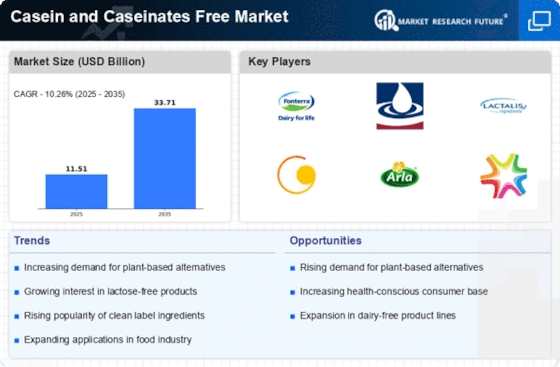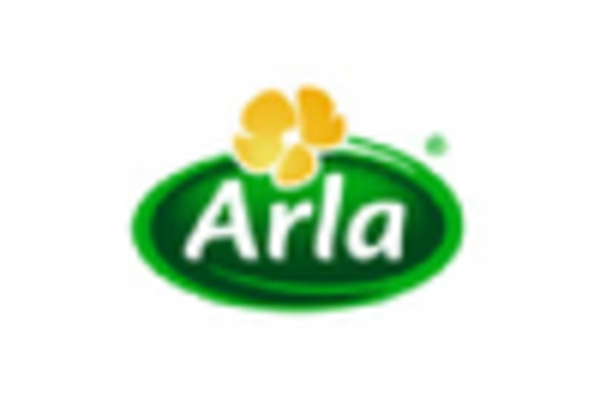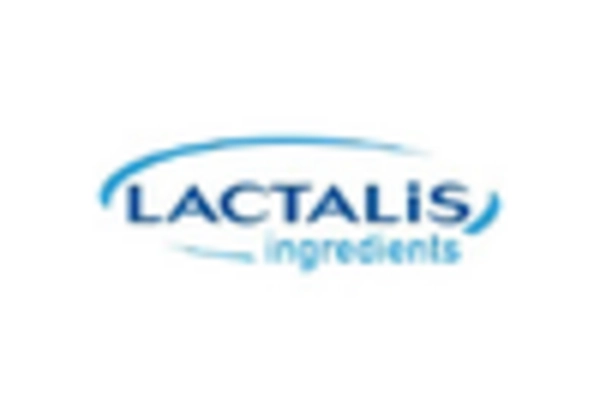-
Executive
-
Summary
-
Scope of the Report
-
Market Definition
-
Scope of the Study
-
List of Assumptions
-
Markets Structure
-
Market Research Methodology
-
Research Process
-
Primary Research
-
Secondary Research
-
Market Size Estimation
-
Forecast Model
-
Market Factor Analysis
-
Supply Chain Analysis
-
Value Chain Analysis
-
Porter''s Five Forces Model
- Threat of New Entrants
- Intensity
- Threat of Substitutes
- Bargaining Power of Suppliers
- Bargaining Power of Buyers
-
of Competitive Rivalry
-
Market Dynamics of
-
Global Casein and Caseinates Free Market
-
Introduction
-
Drivers
-
Restraints
-
Opportunities
-
Challenges
-
Global Casein and Caseinates Free Market, by Source
-
Introduction
-
Soy
- Market Estimates &
-
Forecast, by Region, 2020–2032
-
Almond
- Market Estimates & Forecast, by Region, 2020–2032
-
Coconut
- Market Estimates
-
& Forecast, by Region, 2020–2032
-
Cashew
- Market Estimates & Forecast, by Region,
-
Others
-
Market Estimates & Forecast, by Region, 2020–2032
-
Global Casein and Caseinates Free Market, by Nature
-
Introduction
-
Organic
- Market Estimates
-
& Forecast, by Region, 2020–2032
-
Regular
- Market Estimates & Forecast, by Region,
-
Global Casein and Caseinates Free Market, by Flavor
-
Introduction
-
Flavored
- Market Estimates & Forecast, by Region,
-
Strawberry
-
Vanilla
-
Mango
-
Blueberry
-
Others
-
Plain/Unflavored
-
Market Estimates & Forecast, by Region, 2020–2032
-
Global Casein and Caseinates Free Market, by Consumer
-
Group
-
Introduction
-
Gen X
- Market Estimates &
-
Forecast, by Region, 2020–2032
-
Gen Z
- Market Estimates & Forecast, by Region, 2020–2032
-
Millennials
- Market Estimates
-
& Forecast, by Region, 2020–2032
-
Baby Boomers
- Market Estimates & Forecast, by Region,
-
Global Casein and Caseinates Free Market, by End User
-
Introduction
-
Residential
- Market Estimates & Forecast, by Region,
-
Commercial
-
Market Estimates & Forecast, by Region, 2020–2032
-
Global Casein and Caseinates Free Market, by Distribution
-
Channel
-
Introduction
-
Supermarkets & Hypermarkets
-
& Forecast, by Region, 2020–2032
-
Online
-
Market Estimates & Forecast, by Region, 2020–2032
-
Convenience Stores
- Market Estimates
-
Specialty Stores
- Market Estimates & Forecast, by Region,
-
Market Estimates & Forecast, by Region, 2020–2032
-
Others
- Market Estimates & Forecast, by Region,
-
Global Casein and Caseinates Free Market, by Region
-
Introduction
-
North America
- Market Estimates & Forecast, by Source,
-
Market Estimates & Forecast, by Nature, 2020–2032
-
Market Estimates & Forecast, by Flavor,
-
Market Estimates & Forecast, by Consumer Group, 2020–2032
-
Forecast, by End User, 2020–2032
-
Channel, 2020–2032
-
Market Estimates &
-
Market Estimates & Forecast, by Distribution
-
US
-
Market Estimates & Forecast, by Source, 2020–2032
-
Market Estimates & Forecast, by Nature,
-
Market Estimates & Forecast, by Flavor, 2020–2032
-
Group, 2020–2032
-
Market Estimates & Forecast, by Consumer
-
Market Estimates & Forecast, by End User, 2020–2032
-
Forecast, by Distribution Channel, 2020–2032
-
Market Estimates &
-
Canada
-
Market Estimates & Forecast, by Source,
-
Market Estimates & Forecast, by Nature, 2020–2032
-
Market Estimates & Forecast, by Flavor,
-
Market Estimates & Forecast, by Consumer Group, 2020–2032
-
Forecast, by End User, 2020–2032
-
Channel, 2020–2032
-
Mexico
-
Market Estimates &
-
Market Estimates & Forecast, by Distribution
-
Market Estimates & Forecast, by Source, 2020–2032
-
Market Estimates & Forecast, by Nature,
-
Market Estimates & Forecast, by Flavor, 2020–2032
-
Group, 2020–2032
-
Market Estimates & Forecast, by Consumer
-
Market Estimates & Forecast, by End User, 2020–2032
-
Forecast, by Distribution Channel, 2020–2032
-
& Forecast, by Nature, 2020–2032
-
Market Estimates &
-
Europe
- Market Estimates & Forecast, by Source, 2020–2032
- Market Estimates
- Market Estimates & Forecast, by Flavor,
-
Market Estimates & Forecast, by Consumer Group, 2020–2032
-
Forecast, by End User, 2020–2032
-
Channel, 2020–2032
-
& Forecast, by Nature, 2020–2032
-
Market Estimates &
-
Market Estimates & Forecast, by Distribution
-
Germany
-
Market Estimates & Forecast, by Source, 2020–2032
-
Market Estimates
-
Market Estimates & Forecast, by Flavor,
-
Market Estimates & Forecast, by Consumer Group, 2020–2032
-
Forecast, by End User, 2020–2032
-
Channel, 2020–2032
-
France
-
Market Estimates &
-
Market Estimates & Forecast, by Distribution
-
Market Estimates & Forecast, by Source, 2020–2032
-
Market Estimates & Forecast, by Nature,
-
Market Estimates & Forecast, by Flavor, 2020–2032
-
Group, 2020–2032
-
Market Estimates & Forecast, by Consumer
-
Market Estimates & Forecast, by End User, 2020–2032
-
Forecast, by Distribution Channel, 2020–2032
-
Market Estimates &
-
Italy
-
Market Estimates & Forecast, by Source,
-
Market Estimates & Forecast, by Nature, 2020–2032
-
Market Estimates & Forecast, by Flavor,
-
Market Estimates & Forecast, by Consumer Group, 2020–2032
-
Forecast, by End User, 2020–2032
-
Channel, 2020–2032
-
& Forecast, by Nature, 2020–2032
-
Market Estimates &
-
Market Estimates & Forecast, by Distribution
-
Spain
-
Market Estimates & Forecast, by Source, 2020–2032
-
Market Estimates
-
Market Estimates & Forecast, by Flavor,
-
Market Estimates & Forecast, by Consumer Group, 2020–2032
-
Forecast, by End User, 2020–2032
-
Channel, 2020–2032
-
& Forecast, by Nature, 2020–2032
-
Market Estimates &
-
Market Estimates & Forecast, by Distribution
-
UK
-
Market Estimates & Forecast, by Source, 2020–2032
-
Market Estimates
-
Market Estimates & Forecast, by Flavor,
-
Market Estimates & Forecast, by Consumer Group, 2020–2032
-
Forecast, by End User, 2020–2032
-
Channel, 2020–2032
-
& Forecast, by Nature, 2020–2032
-
Market Estimates &
-
Market Estimates & Forecast, by Distribution
-
Rest of Europe
-
Market Estimates & Forecast, by Source, 2020–2032
-
Market Estimates
-
Market Estimates & Forecast, by Flavor,
-
Market Estimates & Forecast, by Consumer Group, 2020–2032
-
Forecast, by End User, 2020–2032
-
Channel, 2020–2032
-
& Forecast, by Nature, 2020–2032
-
Market Estimates &
-
Market Estimates & Forecast, by Distribution
-
Asia-Pacific
-
Market Estimates & Forecast, by Source, 2020–2032
-
Market Estimates
-
Market Estimates & Forecast, by Flavor,
-
Market Estimates & Forecast, by Consumer Group, 2020–2032
-
Forecast, by End User, 2020–2032
-
China
-
Market Estimates &
-
Market Estimates & Forecast, by Distribution,
-
Market Estimates & Forecast, by Source, 2020–2032
-
Market Estimates & Forecast, by Nature,
-
Market Estimates & Forecast, by Flavor, 2020–2032
-
Group, 2020–2032
-
Market Estimates & Forecast, by Consumer
-
Market Estimates & Forecast, by End User, 2020–2032
-
Forecast, by Distribution Channel, 2020–2032
-
Market Estimates &
-
India
-
Market Estimates & Forecast, by Source,
-
Market Estimates & Forecast, by Nature, 2020–2032
-
Market Estimates & Forecast, by Flavor,
-
Market Estimates & Forecast, by Consumer Group, 2020–2032
-
Forecast, by End User, 2020–2032
-
Channel, 2020–2032
-
& Forecast, by Nature, 2020–2032
-
Market Estimates &
-
Market Estimates & Forecast, by Distribution
-
Japan
-
Market Estimates & Forecast, by Source, 2020–2032
-
Market Estimates
-
Market Estimates & Forecast, by Flavor,
-
Market Estimates & Forecast, by Consumer Group, 2020–2032
-
Forecast, by End User, 2020–2032
-
Channel, 2020–2032
-
Market Estimates &
-
Market Estimates & Forecast, by Distribution
-
Australia & New Zealand
-
Market Estimates & Forecast, by Source,
-
Market Estimates & Forecast, by Nature, 2020–2032
-
Market Estimates & Forecast, by Flavor,
-
Market Estimates & Forecast, by Consumer Group, 2020–2032
-
Forecast, by End User, 2020–2032
-
Channel, 2020–2032
-
& Forecast, by Nature, 2020–2032
-
Market Estimates &
-
Market Estimates & Forecast, by Distribution
-
Rest of Asia-Pacific
-
Market Estimates & Forecast, by Source, 2020–2032
-
Market Estimates
-
Market Estimates & Forecast, by Flavor,
-
Market Estimates & Forecast, by Consumer Group, 2020–2032
-
Forecast, by End User, 2020–2032
-
Channel, 2020–2032
-
& Forecast, by Nature, 2020–2032
-
Market Estimates &
-
Market Estimates & Forecast, by Distribution
-
Rest of the World
-
Market Estimates & Forecast, by Source, 2020–2032
-
Market Estimates
-
Market Estimates & Forecast, by Flavor,
-
Market Estimates & Forecast, by Consumer Group, 2020–2032
-
Forecast, by End User, 2020–2032
-
Channel, 2020–2032
-
South America
-
Market Estimates &
-
Market Estimates & Forecast, by Distribution
-
Market Estimates & Forecast, by Source, 2020–2032
-
Market Estimates & Forecast, by Nature,
-
Market Estimates & Forecast, by Flavor, 2020–2032
-
Group, 2020–2032
-
Market Estimates & Forecast, by Consumer
-
Market Estimates & Forecast, by End User, 2020–2032
-
Forecast, by Distribution Channel, 2020–2032
-
Market Estimates &
-
Middle East
-
Market Estimates & Forecast, by Source,
-
Market Estimates & Forecast, by Nature, 2020–2032
-
Market Estimates & Forecast, by Flavor,
-
Market Estimates & Forecast, by Consumer Group, 2020–2032
-
Forecast, by End User, 2020–2032
-
Channel, 2020–2032
-
Africa
-
Market Estimates &
-
Market Estimates & Forecast, by Distribution
-
Market Estimates & Forecast, by Source, 2020–2032
-
Market Estimates & Forecast, by Nature,
-
Market Estimates & Forecast, by Flavor, 2020–2032
-
Group, 2020–2032
-
Market Estimates & Forecast, by Consumer
-
Market Estimates & Forecast, by End User, 2020–2032
-
Forecast, by Distribution Channel, 2020–2032
-
Market Estimates &
-
Competitive Landscape
-
Introduction
-
Market Key Strategies
-
Key Development Analysis (Expansions/Mergers
-
& Acquisitions/Joint Ventures/New Casein and Caseinates Free Developments/Agreements/Investments)
-
Company
-
Profiles
-
Danone
-
Company Overview
-
Financial Overview
-
Products Offered
-
Key Developments
-
SWOT Analysis
-
Key Strategies
-
Atlantic Natural Foods
-
Beyond Meat
-
ADM
-
Living
-
Harvest Foods Inc.,
-
Sunopta
-
Hain Celestial
-
GEA
-
Tetra
-
Pak
-
Adisoy
-
Appendix
-
-
LIST OF TABLES
-
Table 1: Global Casein
-
and Caseinates Free Market, by Region, 2020–2032
-
Table 2: North America: Casein and Caseinates Free
-
Market, by Country, 2020–2032
-
Table 3: Europe: Casein and Caseinates Free Market, by Country,
-
Table
-
4: Asia-Pacific: Casein and Caseinates Free Market, by Country, 2020–2032
-
Table 5: Rest of the
-
World: Casein and Caseinates Free Market, by Country, 2020–2032
-
Table 13: Global Casein
-
and Caseinates Free Source Market, by Region, 2020–2032
-
Table 14: North America: Casein
-
and Caseinates Free Source Market, by Country, 2020–2032
-
Table 15: Europe: Casein and
-
Caseinates Free Source Market, by Country, 2020–2032
-
Table 16: Asia-Pacific: Casein and Caseinates Free
-
Source Market, by Country, 2020–2032
-
Table 17: Rest of the World: Casein and Caseinates
-
Free Source Market, by Country, 2020–2032
-
Table 13: Global Casein and Caseinates Free Nature
-
Market, by Region, 2020–2032
-
Table 14: North America: Casein and Caseinates Free Nature
-
Market, by Country, 2020–2032
-
Table 15: Europe: Casein and Caseinates Free Nature Market,
-
by Country, 2020–2032
-
Table 16: Asia-Pacific: Casein and Caseinates Free Nature Market, by
-
Country, 2020–2032
-
Table 22:Rest of the World: Casein and Caseinates Free Nature Market,
-
by Country, 2020–2032
-
Table 19: Global Casein and Caseinates Free Flavor Market, by Region,
-
Table
-
20: North America: Casein and Caseinates Free Flavor Market, by Country, 2020–2032
-
Table 21: Europe: Casein
-
and Caseinates Free Flavor Market, by Country, 2020–2032
-
Table 22: Asia-Pacific: Casein
-
and Caseinates Free Flavor Market, by Country, 2020–2032
-
Table 22:Rest of the World: Casein
-
and Caseinates Free Flavor Market, by Country, 2020–2032
-
Table 19: Global Casein and Caseinates
-
Free Consumer Group Market, by Region, 2020–2032
-
Table 20: North America: Casein and Caseinates Free
-
Consumer Group Market, by Country, 2020–2032
-
Table 21: Europe: Casein and Caseinates Free Consumer
-
Group Market, by Country, 2020–2032
-
Table 22: Asia-Pacific: Casein and Caseinates Free
-
Consumer Group Market, by Country, 2020–2032
-
Table 22:Rest of the World: Casein and Caseinates
-
Free Consumer Group Market, by Country, 2020–2032
-
Table 19: Global Casein and Caseinates Free End User
-
Market, by Region, 2020–2032
-
Table 20: North America: Casein and Caseinates Free End
-
User Market, by Country, 2020–2032
-
Table 21: Europe: Casein and Caseinates Free End User Market,
-
by Country, 2020–2032
-
Table 22: Asia-Pacific: Casein and Caseinates Free End User Market,
-
by Country, 2020–2032
-
Table 22:Rest of the World: Casein and Caseinates Free End User Market,
-
by Country, 2020–2032
-
Table 19: Global Casein and Caseinates Free Distribution Channel Market,
-
by Region, 2020–2032
-
Table 20: North America: Casein and Caseinates Free Distribution Channel
-
Market, by Country, 2020–2032
-
Table 21: Europe: Casein and Caseinates Free Distribution
-
Channel Market, by Country, 2020–2032
-
Table 22: Asia-Pacific: Casein and Caseinates Free
-
Distribution Channel Market, by Country, 2020–2032
-
Table 22: Rest of the World: Casein and Caseinates
-
Free Distribution Channel Market, by Country, 2020–2032
-
Table
-
23: Global: Casein and Caseinates Free Market, by Region, 2020-2030
-
Table 23: Global: Casein and
-
Caseinates Free Market, by Source, 2020-2030
-
Table 23: Global: Casein and Caseinates Free Market,
-
by Nature, 2020-2030
-
Table
-
23: Global: Casein and Caseinates Free Market, by Flavor, 2020-2030
-
Table 23: Global: Casein and
-
Caseinates Free Market, by Consumer Group, 2020-2030
-
Table 23: Global: Casein and Caseinates Free Market,
-
by End User, 2020-2030
-
Table
-
23: Global: Casein and Caseinates Free Market, by Distribution Channel, 2020-2030
-
Table
-
27: North America: Casein and Caseinates Free Market, by Country, 2020-2030
-
Table 28: North America:
-
Casein and Caseinates Free Market, by Source 2020-2030
-
Table 28:North America: Casein and Caseinates Free
-
Market, by Nature, 2020-2030
-
Table 28: North America: Casein and Caseinates Free Market, by Flavor,
-
Table
-
28: North America: Casein and Caseinates Free Market, by Consumer Group, 2020-2030
-
Table 30: North America:
-
Casein and Caseinates Free Market, by End User 2020-2030
-
Table 30: North America: Casein and Caseinates Free
-
Market, by Distribution Channel 2020-2030
-
Table 27: Europe: Casein and Caseinates Free Market,
-
by Country, 2020-2030
-
Table
-
28: Europe: Casein and Caseinates Free Market, by Source 2020-2030
-
Table 28: Europe Casein and Caseinates
-
Free Market, by Nature, 2020-2030
-
Table 29: Europe: Casein and Caseinates Free Market, by Flavor, 2020-2030
-
Table 27: Europe: Casein
-
and Caseinates Free Market, by Consumer Group, 2020-2030
-
Table 28: Europe: Casein and Caseinates Free Market,
-
by End-User, 2020-2030
-
Table
-
29: Europe: Casein and Caseinates Free Market, by Distribution Channel, 2020-2030
-
Table
-
27: Asia-Pacific: Casein and Caseinates Free Market, by Country, 2020-2030
-
Table 28: Asia-Pacific:
-
Casein and Caseinates Free Market, by Source, 2020-2030
-
Table 29: Asia-Pacific: Casein and Caseinates Free
-
Market, by Nature, 2020-2030
-
Table 27: Asia-Pacific: Casein and Caseinates Free Market, by Flavor,
-
Table
-
28: Asia-Pacific: Casein and Caseinates Free Market, by Consumer Group, 2020-2030
-
Table 29: Asia-Pacific:
-
Casein and Caseinates Free Market, by End User, 2020-2030
-
Table 30: Asia-Pacific: Casein and Caseinates Free
-
Market, by Distribution Channel, 2020-2030
-
Table 27: Rest of the World: Casein and Caseinates
-
Free Market, by Country, 2020-2030
-
Table 28: Rest of the World: Casein and Caseinates Free
-
Market, by Source, 2020-2030
-
Table 29: Rest of the World: Casein and Caseinates Free Market, by
-
Nature, 2020-2030
-
Table
-
27: Rest of the World: Casein and Caseinates Free Market, by Flavor, 2020-2030
-
Table 28: Rest of the
-
World: Casein and Caseinates Free Market, by Consumer Group, 2020-2030
-
Table 29: Rest of the
-
World: Casein and Caseinates Free Market, by End User, 2020-2030
-
Table 30: Rest of the World:
-
Casein and Caseinates Free Market, by Distribution Channel 2020-2030
-
LIST OF FIGURES
-
Global Casein and Caseinates Free Market Segmentation
-
Forecast Research
-
Methodology
-
FIGURE
-
Porter''s Five Forces Analysis of the Global Casein and Caseinates Free Market
-
Value Chain/Supply
-
Chain of Global Casein and Caseinates Free Market
-
Share of Global Casein and Caseinates Free
-
Market, by Country, 2021 (%)
-
Global Casein and Caseinates Free Market, 2020–2032
-
Global Casein
-
and Caseinates Free Market Size, by Source, 2020–2032
-
Share of Global Casein and Caseinates Free
-
Market, by Source, 2021 (%)
-
Global Casein and Caseinates Free Market Size, by Nature,
-
FIGURE
-
Share of Global Casein and Caseinates Free Market, by Nature, 2021 (%)
-
Global Casein
-
and Caseinates Free Market Size, by Flavor, 2020–2032
-
Share of Global Casein and Caseinates Free
-
Market, by Flavor, 2021 (%)
-
Global Casein and Caseinates Free Market Size, by Consumer
-
Group, 2020–2032
-
FIGURE
-
Share of Global Casein and Caseinates Free Market, by Consumer Group, 2021 (%)
-
Global Casein
-
and Caseinates Free Market Size, by End User, 2020–2032
-
Share of Global Casein
-
and Caseinates Free Market, by End User, 2021 (%)
-
Global Casein and Caseinates Free Market
-
Size, by Distribution Channel, 2020–2032
-
Share of Global Casein and Caseinates Free
-
Market, by Distribution Channel, 2021 (%)


















Leave a Comment